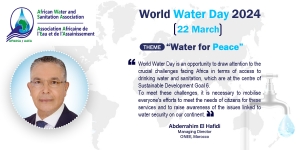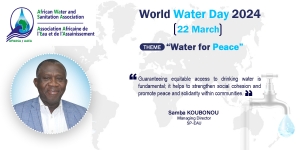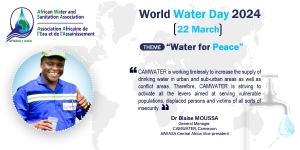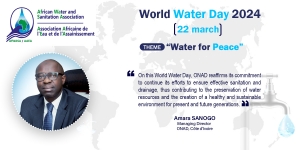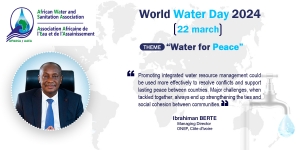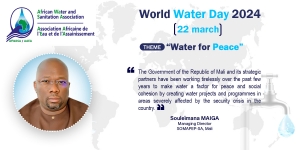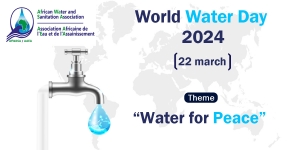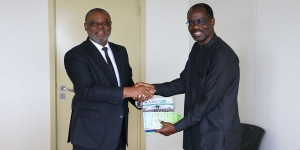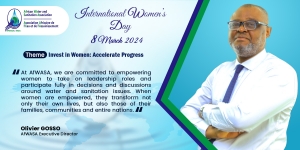Nzickonan Stéphanie
WWD 2024: Message from the Managing Director of Office National de l'Electricité et de l'Eau Potable, Morocco
World Water Day is an opportunity to draw attention to the crucial challenges facing Africa in terms of access to drinking water and sanitation, which are at the centre of Sustainable Development Goal 6.
To meet these challenges, it is necessary to mobilise everyone's efforts to meet the needs of citizens for these services and to raise awareness of the issues linked to water security on our continent.
WWD 2024: Message from the Managing Director of Office National de l'Eau et de l'Assainissement of Burkina Faso
Access to water and sanitation is a fundamental human right. Making this right effective everywhere and for everyone remains a major challenge, given that freshwater resources are very limited and must be used for a variety of purposes, from agriculture to energy production, industry and human consumption.
People's daily well-being depends to a large extent on access to drinking water and sustainable sanitation services. The preservation and strategic, integrated management of this precious resource is therefore essential, by all and for all, to ensure peace.
In addition to water-related conflicts between nations, many countries, including Burkina Faso, are having to cope with damage to their drinking water infrastructure, contrary to the principles of the "Geneva List of Principles for the Protection of Water Infrastructure" of July 2020.
For more than five years, Burkina Faso has been experiencing a deteriorating security situation, which has unfortunately affected water infrastructure and the quality of service provided to the population in certain areas.
In an unstable security context, the supply of drinking water and the provision of adequate sanitation services must remain key areas of intervention, because the survival of the populations affected, their dignity and the preservation of the social fabric depend on it.
As a result, governments and operators are being called upon to rethink their approaches and strengthen their capacity to maintain, protect and preserve water services in the context of security and humanitarian crises, because water brings life and water brings peace.
WWD 2024: Message from the Managing Director of Société de Patrimoine Eau et Assainissement of Togo
Guaranteeing equitable access to drinking water is fundamental; it helps to strengthen social cohesion and promote peace and solidarity within communities.
WWD 2024: Message from the Managing Director of Cameroon Water Utilities Corporation
The international community will this year celebrate the World Water Day under the theme “Water for Peace”. This theme challenges us in a particular and urgent way. In most of our countries, peace remains fragile. Moreover, social peace is a real commitment for drinking water soldiers that are water and sanitation utilities. Our daily lives are made up of many challenges that have to be overcome by African companies in charge of the distribution of drinking water and sanitation issues. Indeed, the supply of safe drinking water for the benefit of vulnerable groups is a factor of resilience and development in Africa in general and in Central Africa in particular, given the conflict-affected areas. These undermine the efforts made by our various Governments to increase the rate of access to safe drinking water in accordance with the Sustainable Development Goals (SDGs).
Aware of the challenges related to access to safe drinking water for the preservation of peace in general and social peace in particular, as well as its positive impact on survival and well-being of many refugees and internally displaced people arriving in Cameroon due to internal and external crises, the Cameroon Water Utilities Corporation (CAMWATER) has set to work resolutely, particularly in the border towns, with the support of the Government, bilateral and multilateral partners. In compliance with the instructions of H.E. Mr Paul BIYA, President of the Republic, reiterated in his message to the Nation on December 31, 2023, CAMWATER is working tirelessly to increase the supply of drinking water in urban and sub-urban areas as well as conflict areas. Therefore, CAMWATER is striving to activate all the levers aimed at serving vulnerable populations, displaced persons and victims of all sorts of insecurity. With the support of development partners and humanitarian agencies such as the International Committee of the Red Cross (ICRC), we have made significant investments to strengthen drinking water supply systems in the North west, South west and Far North Regions. These are direct impact projects to support these vulnerable populations and ensure peace. In 2024, CAMWATER will implement drinking water supply projects in the cities of Yaounde and Douala, given the massive presence of internally displaced persons as a result of the crisis in English-speaking regions.
Water for Peace is a perfect reflection of this holistic vision of peace and stability ensured by access to a vital need, necessary for the stability of our countries, our economies and fundamental to strengthen the resilience of communities affected by conflict.
WWD 2024: Message from the Managing Director of Office National de l'Assainissement et du Drainage, Côte d'Ivoire
On this World Water Day, ONAD reaffirms its commitment to continue its efforts to ensure effective sanitation and drainage, thus contributing to the preservation of water resources and the creation of a healthy and sustainable environment for present and future generations.
WWD 2024: Message from the Managing Director of Office National de l'Eau Potable, Côte d'Ivoire
The world's population is growing, the world has become a global village, distances between peoples are becoming narrower, and humanity is facing many challenges. A problem experienced in a country in the South has repercussions on the lives of people in countries in the North, and vice versa, because of the close links between peoples. To remedy this, we need to combine all our efforts.
In recent decades, the world has been faced with climate change, which is inevitably having an impact on water resources. These resources are a common good that involves us all, and that all nations agree must be preserved.
It is a major and complex challenge that we must face today. The water available, in limited quantities, must cover all uses. Human consumption, agriculture, industry, and energy production all require a balanced and concerted sharing of “blue gold”. The resource therefore needs to be preserved, so that we have quality water for present and future generations.
As a universal and indispensable resource, water can serve as a foundation for building trust and as a potential starting point for peace.
Promoting integrated water resource management could be used more effectively to resolve conflicts and support lasting peace between countries. Major challenges, when tackled together, always end up strengthening the ties and social cohesion between communities.
WWD 2024: Message from the Managing Director of Société Malienne de Patrimoine de l'Eau Potable
World Water Day (WWD) is an opportunity for all professionals in the sector to take a look back at the issue of access to drinking water in our countries and look to the future to meet the increasingly pressing challenges of climate change.
This year, the event is being celebrated under the generic theme of “Water for Peace”. This theme is perfectly suited to the national political will in the Republic of Mali. It aims to draw the attention of the highest authorities, stakeholders in the sector and the general public to the importance of water and the sustainable management of water resources as a factor for peace in a context of climate change.
With this in mind, the Government of the Republic of Mali and its strategic partners have been working tirelessly over the past few years to make water a factor for peace and social cohesion by creating water projects and programmes in areas severely affected by the security crisis in the country.
One such initiative is the Access to Drinking Water and Sanitation Project (AEPA), financed by KFW to the tune of CFAF 16 billion for the city of Timbuktu and the surrounding area.
The project will last 24 months from January 2024, and will cover the city of Timbuktu's water needs until 2040. This will have a short- and medium-term impact on limiting water stress and calming the social climate in the Timbuktu region.
In addition to this project, the Government of the Republic is committed to a vast water programme that will benefit the whole country. This makes sense in a country where access to drinking water is even part of cultural wisdom. “Aman, iman”: water is life, say the Tamasheq.
World Water Day 2024: AfWASA is committed to making universal access to water a reality Africa
The African Water and Sanitation Association, like the International Community, is celebrating World Water Day on the theme: "Water for Peace". To mark the occasion, AfWA, with the support of its members, is launching a communication campaign to reaffirm their strong commitment to making universal access to water a reality on the continent. During this week, Managing Directors of the Association's member companies as well as the Executive Director of AfWASA will share their views on the theme of the day, and their commitment to working together to improve access to water for the populations of their countries.
About World Water Day
Every year on March 22, World Water Day raises public awareness and encourages action to tackle the water and sanitation crisis. This annual United Nations celebration is coordinated by UN-Water and orchestrated by one or more of its members and partners working in related fields, including the African Water and Sanitation Association.
The theme of each edition which is suggested in advance by UN-Water, is aligned with the annual publication of the United Nations World Water Development Report, published by UNESCO on behalf of UN-Water as part of UNESCO's World Water Assessment Programme (WWAP).
In 2024, the theme of World Water Day is "Water for Peace", and the World Water Development Report is entitled "Water for Peace and Prosperity".The World Water Day campaign is simply entitled "Water for Peace".
The African Development Bank (AfDB) renews its confidence in AfWASA, and commits to supporting the Associations’ activities
The New Executive Director of AfWASA, Mr. Olivier Gosso, held a working session this Friday, March 08, 2024 at the African Development Bank's Water and Sanitation Department. The purpose of the visit was to introduce himself to the heads of this department, thank them for all the support the bank provides to the Association, and request a more formal cooperation framework.
Mr. Gosso also took the opportunity to unveil his vision as the Association's new Director. This vision can be summed up in four (4) main points, namely 1) to develop close cooperative relations with partners, through a clear definition of expectations on both sides, 2) to strengthen relations with members through a decentralization of activities, 3) to continue restructuring the Association's bodies by making specialist groups functional and effective, and finally 4) to strengthen advocacy so that favorable policies are put in place to significantly improve access to water and sanitation services. Finally, the Executive Director submitted a draft cooperation document to the AfDB.
Mr. Osward Chanda, Director of the AfDB's Water and Sanitation Department, welcomed the Executive Director's initiative. He welcomed AfWASA's similar actions with the AfDB, particularly in terms of the decentralization of activities. He reaffirmed the Bank's commitment to supporting the Association in the implementation of its programs, and promised to study with particular interest the cooperation proposal received. Finally, he proposed periodic meetings to discuss the progress of the cooperation.
The meeting took place in Abidjan, at the headquarters of the African Development Bank.
IWD2024: Message from the Executive Director of the African Water and Sanitation Association
Dear women, especially those in the water and sanitation sector,
On this International Women's Day, on behalf of AfWASA, I would like to send you a message of deep admiration and respect for your incredible strength, your perseverance and your invaluable contribution to humanity.
I am fully aware of the crucial role you play in the sector.
Your courage, intelligence and resilience are the foundations on which our relentless fight for people's access to water and sanitation services is built.
This year's theme, "Investing in women: accelerating the pace", resonates deeply with the urgency of taking action to promote gender equality and women's empowerment. It is important to give women the resources, opportunities and support they need to thrive. That is why at AfWASA, we are committed to empowering women to take on leadership roles and participate fully in decisions and discussions around water and sanitation issues. When women are empowered, they transform not only their own lives, but also those of their families, communities and entire nations.
May this International Women's Day be a time of celebration, reflection and action as we continue to move forward together towards a fairer, more egalitarian future for all.
With all my admiration and support,
Olivier GOSSO.

 English
English  Français
Français 
